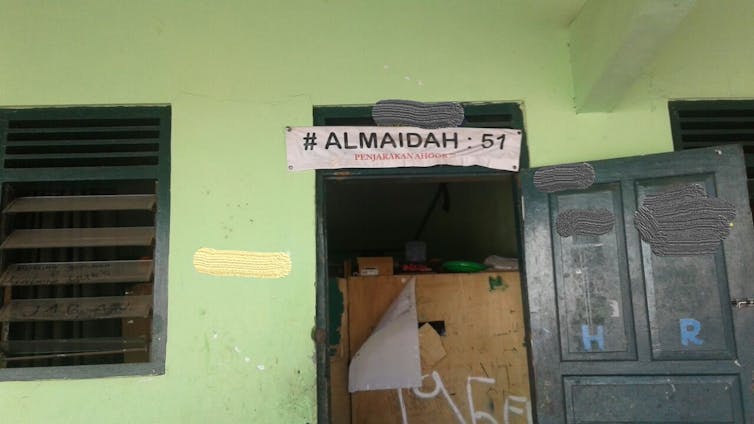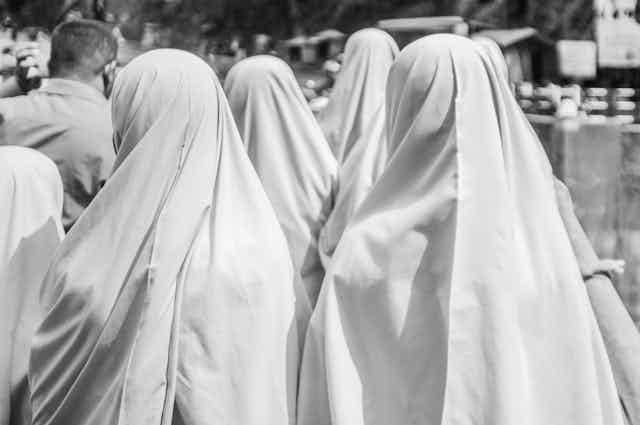A series of terrorist acts has rocked Indonesia in the past week. Starting from a clash in a detention centre at the Police Mobile Brigade headquarters in Depok, West Java, last week, attackers then bombed three churches in Surabaya, East Java, last Sunday, followed by another terrorist bombing at Surabaya Police Headquarters. Dozens were killed and wounded.
In response, President Joko “Jokowi” Widodo has reiterated the government’s commitment to exterminate terrorism down to its roots.
We must appreciate Jokowi’s statement. However, terrorism is a complex issue because there is no single factor that can explain why a person becomes a terrorist.
The importance of schools to prevent radicalism
One of the strategies that the government can use to stop terrorism in Indonesia is to take preventive steps using educational institutions to promote tolerance, which can eventually stop the spread of radical thoughts.
But what is happening in Indonesia is the opposite. Many schools in Indonesia have become fertile ground for radicalism.
The latest surveys from the Wahid Institute, Pusat Pengkajian Islam Masyarakat and the Centre for Study of Islam and Society (PPIM) and Setara Institute have indicated the spread of intolerance and radical values in educational institutions in Indonesia.
A student tolerance survey from Setara Institute in 2016 revealed that 35.7% of the students showed a tendency to intolerance in their minds, 2.4% were involved in acts of intolerance, and 0.3% had the potential to become terrorists. The survey was based on 760 respondents who enrolled in public high schools in Jakarta and Bandung, West Java.
Surveys from the Wahid Institute and PPIM have shown the same worrying trend.
The characteristics of schools prone to radicalism
In 2017, I was involved in research on efforts to respond to radicalism at 20 private Islamic schools in Central Java. The research involved academics from Monash University in Australia, Walisongo State Islamic University in Semarang, Central Java, and Gadjah Mada University in Yogyakarta with funding support from the Australia-Indonesia Centre.
We managed to identify three types of schools that are prone to radicalism. In accordance with confidentiality principles, we will not publish the schools’ names in this article.
These three types of schools are:
Closed schools
Instead of embracing changes, this type of school offers students a narrow perspective and tends to shut them off from foreign ideas.
We interviewed one of the headmasters from these schools. He explained the importance of Islamic civilisation to protect students against Western values.
Aside from see Islam and the West as being in conflict, closed schools also stress the importance of practising their version of Islamic teachings and reject the moderate Islam that most Muslims adhere to in Indonesia.

Separated schools
These schools can be identified from their teacher recruitment system and their limited participation in social activities.
The teacher recruitment process in these schools is very strict, especially the recruitment of religion teachers. In addition, these schools do not want to participate in social activities that they deem to be against their values.
This type of school is very different from other Islamic schools that are affiliated with the country’s more traditional Muslim organisations such as Nahdlatul Ulama (NU) or Muhammadiyah. Whereas separated schools recruit religion teachers from their own groups only and will use their networks to recruit alumni who share the same Islamic values, NU and Muhammadiyah schools will not consider differences in their teachings as an issue. For example, one of the headmasters from a NU-affiliated school stated that his school also recruited teachers from Muhammadiyah.
NU and Muhammadiyah schools are also active in social activities, including interfaith activities. Separated schools are not.
Schools with pure Islamic identity
The third type can be identified by the way they create students’ Islamic identity. The schools that are prone to radicalism tend to build in a student a single Islamic identity, refusing other identities.
This understanding is different from other Islamic schools, which tend to consider that a person’s identity as a Muslim is not against his/her other identity. Moderate Islamic schools do not see a conflict between their students’ identity as Muslims and as Indonesian citizens.
When a school builds this single Muslim identity, that school will also foster radical attitudes among students as they only believe in a single Islamic interpretation that is in line with their values.
Headmasters from this type of school usually order their students to follow all religious rituals at schools, despite the students’ different religious background.
A headmaster told us that his students with a NU background must abandon their prayer ritual in the morning called qunut when they are enrolled in his schools.
This policy is different from other schools that allow flexibility for their students in their religious practices.
In addition, the rejection of other identities creates a “we versus them” attitude not only between different religions but also within the larger Islamic community itself.
What we can do
These three types of schools contribute to the growth of intolerance as well as radicalism at schools, which can lead to terrorist acts.
Therefore, we believe that the recent terrorist attacks should give momentum to the government to plan preventive measures to promote diversity, social integrity and diverse identities in various schools across the country.
The government’s campaign on tolerance should reach different educational institutions via the Culture and Education Ministry as well as Religious Affairs Ministry.
The government must also provide platforms and programs to promote tolerance. Apart from that, related government institutions in the regions must develop the capacity to identify schools that are prone to radicalism and apply persuasive approaches to prevent the spread of radicalism in those schools.


